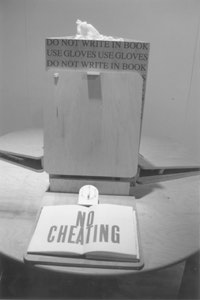
Testing A, B, C: Diane Jacobs' "Knowledgeable" installation mocks the cultural biases of standarized, multiple-choice testing.
A new show at WORKS prods the boundaries of identity
By Ann Elliott Sherman
FAR FROM supplying a contrived, narrow focus that attempts to rein in audience response, Seeking Security, the new themed exhibit at WORKS/San Jose, functions like a rock tossed in a pond. The show's examination of the tension between the individual and society initiates a gradually expanding realization of how many ways personal freedom and identity run up against the boundaries they paradoxically require.
Knowledgeable, an installation by Diane Jacobs, takes on the idea of measuring who's fit to enter the gates of academic privilege. Jacobs couches her critique in an exquisitely crafted sendup of the standardized testing experience.
The viewer sits at one of three "test stations" set up on a round wooden table, each screened from the others. Opening a hinged writing desk reveals a timer and a mock test booklet. Jacobs' multiple-choice questions and word problems make the issues of gender, class and cultural bias in such tests explicit. There is, for example, a generic image of a home coupled with the instruction to "choose only ONE answer": a) flat; b) house; c) casa; or d) apartment. After seeing Jacobs' installation, copping a high score on one of the alphabet-soup exams might seem a dubious achievement.
Ines Kramer's Before/After series spoofs fashion-magazine make-overs by juxtaposing a plain-Jane woman's pump with its mate, which has been embellished to correct an identified "trouble area." The touch of levity is welcome, but as critiques of the social pressures to conform to idealized norms of female beauty go, it's not exactly a heavy hitter, visually or otherwise.
Ben Rubin ransacks visual elements, styles and vernacular from the urban landscape and scrambles them into an idiosyncratic spray-painted and stenciled Esperanto that plays with societal assumptions about who says what, where and how. It's as though an alien cultural anthropologist had reassembled fragments of billboards, funky song lyrics and second-rate horror movie posters without regard to context or chronology. A caution-yellow AFL-CIO handshake logo bears a bloody admonition to Play Dead; a manic and drippily rendered woman cribbed from ad graphics demands Give Me the Props.
Cross-pollinated with a skewed personal perspective, these posterlike paintings are too bizarre and casually executed to be dismissed as another instance of romanticized slumming or commercial appropriation of street culture. Rubin's work acknowledges the two-way osmosis of cultural assimilation. But this isn't a feel-good, PC celebration of unity and diversity so much as a testament to a muddled sense that everywhere can begin to feel the same as nowhere in the global village.
The "silent dramas" portrayed in the 15 gelatin silver photographs of Diana Keller's Unspoken Terms feel like a disassembled flip book of one woman's contortions to fit within the symbolic constraints of a relationship or social norms. Formal and shot at a removed distance, Keller's approach is an odd blend of the conceptual and clinical.
AT THE OTHER extreme are the torrents-of-consciousness text paintings of Ann Barth. These excerpts from diaries or letters are copied by hand in black paint on white canvases, with misspellings left intact. The boundaries between "me" and "you" get blurred, as if to prove true the chronicled fear about how connection with another means loss of self.
In Lemon Coconut, references to food and eating mingle with sexual desire, torment and sacrifice--specters of an all-consuming love. Turtle Hard gets even more difficult to read, as drips of paint increasingly obscure the more violent, overtly sexual text, as though it were tear-stained, and the confusion about who's manipulating who mounts. Whether a catharsis of personal demons or an exposé of social pathology, the paintings add another layer of meaning as they confront the viewer with a scary kind of intimacy many will want to flee.
Sebastian Mendes' elegant sculptures are an unusual blend of wit, insight and depth. Look into Telemirror, and you see yourself coming and going, the images continuing on into apparent infinity. It's a nifty bit of fun-house drama positing the powerful influence of television upon self-perception and its multiplier effect upon the subjective realities it projects.
A diverse look at the bipolar urges for nonconformity and control, the show trusts our ability to handle ambiguity and consider tradeoffs a rewarding change from campaign speeches or sermons to the choir.
Seeking Security runs through Nov. 2 at WORKS/San Jose, 260 Jackson St. (408/295-8378)
[ Metro | Metroactive Central | Archives ]
![[Metroactive Arts]](/arts/gifs/art468.gif)